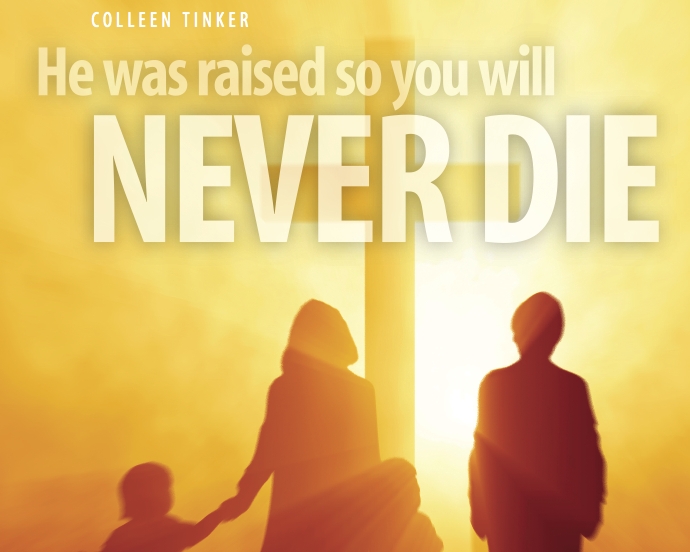HOME / PROCLAMATION! MAGAZINE / 2012 / SPRING / HE WAS RAISESD SO YOU WILL NEVER DIE
S P R I N G • 2 0 1 2
VOLUME 13, ISSUE 1

From the time I was a young girl, I privately sneered at Easter. I was so fortunate to know better than those Sunday-keepers; Easter was a non-event. Of course Jesus rose from the grave and showed us how we would also rise one day. But to make a holiday out of Easter Sunday was just a nod to the papacy. If we wanted to honor Jesus’ death, we would keep the Sabbath, as He did when He rested in the tomb and honored His day. He did the hard work on Sunday! Those poor Christians who celebrated the day of non-rest with new dresses and ham dinners—the whole situation was too ironic for words!
Saved by His life?
When I finally understood that Jesus had actually completed the atonement on the cross and that we pass from death to life when we place our trust in Him, Easter became the most joyous day of the year—even better than Christmas! Even though I felt a sense of deep joy and worship at Easter, however, I continued to have a sense that there was more to this event than I was comprehending.
Romans 5:10 caught my attention and demanded that I ponder it: “For if while we were enemies we were reconciled to God through the death of His Son, much more, having been reconciled, we shall be saved by His life.”
What did that mean, “we shall be saved by His life”?
And then there was Romans 8:10-11:
“If Christ is in you, though the body is dead because of sin, yet the spirit is alive because of righteousness. But if the Spirit of Him who raised Jesus from the dead dwells in you, He who raised Christ Jesus from the dead will also give life to your mortal bodies through His Spirit who dwells in you.”
What did that mean, “give life to your mortal bodies”? Did that mean resurrection—or did that mean something here and now—or both?
In order to understand what it means for us to be saved by Jesus’ life, we have to go back—all the way back to Adam, Eve, and the tree of the knowledge of good and evil. What really happened that day our parents ate the fatal fruit?
Did they die—or didn’t they?
God had just created Adam and had placed him in the garden that He had planted in Eden. He commissioned Adam to work and keep the garden, and then He gave him a command: “You may surely eat of every tree of the garden, but of the tree of the knowledge of good and evil you shall not eat, for in the day that you eat of it you shall surely die” (Gen. 2:16-17).
We don’t know how much time passed between that day and the day that Eve succumbed to the serpent and drew Adam into disobeying God’s command with her, but we do know that the serpent promised Eve that eating the fruit would not yield death (Gen. 3:4). Instead, she would “be like God, knowing good and evil” (Gen. 3:5).
Indeed, they were still living, breathing, talking, and eating after they broke God’s command. So, was the serpent telling the truth?
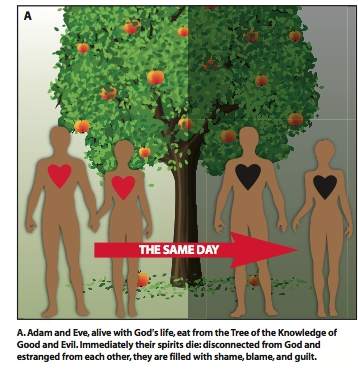 Many of us with Adventist upbringings learned that “they began to die” that day. Because Adventism believes humans are physical bodies that cease to exist after death, it does not have a good way to explain what happened. Thus “they began to die” is the only way Adventism can explain that Adam and Eve didn’t cease to breathe the day they ate the fruit. In fact, Adventism’s explanation actually sounds a bit like Satan’s deception: they didn’t actually die that day—but they began to die.
Many of us with Adventist upbringings learned that “they began to die” that day. Because Adventism believes humans are physical bodies that cease to exist after death, it does not have a good way to explain what happened. Thus “they began to die” is the only way Adventism can explain that Adam and Eve didn’t cease to breathe the day they ate the fruit. In fact, Adventism’s explanation actually sounds a bit like Satan’s deception: they didn’t actually die that day—but they began to die.
If Adam and Eve merely “began to die”, however, God didn’t really tell Adam the truth but figuratively overstated the facts in order to ensure Adam’s compliance. Scripture, however, is very clear that God cannot and does not lie. Numbers 23:19 states, “God is not man, that he should lie, or a son of man, that he should change his mind. Has he said, and will he not do it? Or has he spoken, and will he not fulfill it?”
The truth is that Adam and Eve did die the day they ate that fruit. They died spiritually, and that spiritual death was not simply a metaphor. It was literal, and that spiritual death is Adam’s legacy to every human since that day.
We know they died for two reasons: God said they would, and they demonstrated the effects of spiritual death. As soon as they ate the fruit, they knew they were naked; they hid their nakedness from each other; they hid from the presence of God, and they refused to own their own guilt. Eve blamed the serpent, and Adam blamed Eve. Neither was willing to admit his/her guilt for refusing to trust God’s word to them, and their spirits were disconnected from the life of God. Disconnected from God, their spirits were dead. They did not cease to exist, but they were dead because they were separated from the Source of life.
Adam and Eve’s living spirits died after they ate the fruit. In the following diagrams, their original living spirits connected to God are demonstrated by red hearts; their spirits lost their life after eating the tree and are represented as black hearts (see diagram A).
What about us?
Scripture tells us that, ever since that day, we all have been born with dead spirits, a condition that renders us unable to seek God, to fear God, to understand, to do good, or to know peace. We have all become worthless; we deceive, curse, and spew bitterness. We walk in ruin and misery (Rom. 3:10-18). We are born spiritually dead with mortal bodies also doomed to death. Paul explains it like this:
For as by a man came death, by a man has come also the resurrection of the dead. For as in Adam all die, so also in Christ shall all be made alive (1 Cor. 15:21-22).
Therefore, just as sin came into the world through one man, and death through sin, and so death spread to all men because all sinned—for sin indeed was in the world before the law was given, but sin is not counted where there is no law. Yet death reigned from Adam to Moses, even over those whose sinning was not like the transgression of Adam, who was a type of the one who was to come (Rom. 5:12-14).
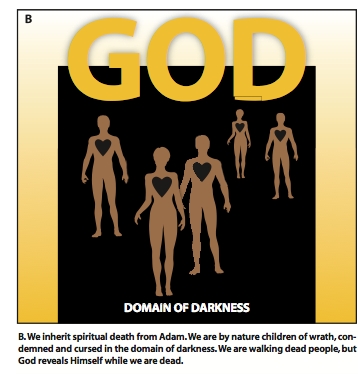 And you were dead in the trespasses and sins in which you once walked, following the course of this world, following the prince of the power of the air, the spirit that is now at work in the sons of disobedience—among whom we all once lived in the passions of our flesh, carrying out the desires of the body and the mind, and were by nature children of wrath, like the rest of mankind (Eph. 2:1-3).
And you were dead in the trespasses and sins in which you once walked, following the course of this world, following the prince of the power of the air, the spirit that is now at work in the sons of disobedience—among whom we all once lived in the passions of our flesh, carrying out the desires of the body and the mind, and were by nature children of wrath, like the rest of mankind (Eph. 2:1-3).
Even David says that he was “brought forth in iniquity” and that his mother conceived him “in sin” (Ps. 51:5). Furthermore, Paul says in Colossians 1:13 that we start out in the “domain of darkness” but that God transfers us into the “kingdom of His beloved Son” when we place our faith in Him. Finally, Jesus Himself emphasized our natural state of doom when He said, “He who does not believe is condemned already, because he has not believed in the only begotten Son of God” (Jn. 3:18).
In short, we begin our lives doomed to destruction because of our own fatal flaw bequeathed to us by Adam. We are born into a “communal grave”* we’ll call the Domain of Darkness. God can reveal Himself and give us evidence of His power; He can awaken our desire to have life instead of the despair that is our legacy, but there is no natural exit from this crypt of doom (see diagram B).
Rescue!
Here’s where the story turns. Our hopeless condition did not come as a surprise to God. Contrary to what many of us learned—that after Adam and Eve sinned Jesus asked the Father if He could come and die for us—the Trinity planned our redemption in advance. God knew Adam would sin, and the Lord Jesus was committed to be the “lamb without blemish or spot” who would be “made manifest in the last times for the sake of you”; He was raised “from the dead” and was glorified by God so we would have faith and hope in God (1 Pet. 1:19-21).
Moreover, God chose believers in Christ “before the foundation of the world, that we should be holy and blameless before him” (Eph. 1:4). In fact, our names, if we are His, have been written in the Lamb’s Book of Life since before the foundation of the world (Rev. 13:8; 17:8).
God knew there would be only one way we could escape from our communal tomb. He Himself would have to redeem us. It was He who said that if we sinned, we would die. Because we are Adam’s descendants, we are sinners, and our spirits are disconnected from God, and only our Creator can restore life to us. Our Creator, therefore, became the Mediator between us and God and “gave himself as a ransom for all, which is the testimony given at the proper time” (2 Tim. 2:8-9).
Jesus, the Son of God, came to the earth to bring life back to the human race. He came in a real human body, and as the Son of Man he lived the perfect life none of us could live. This incarnation is a mystery which God has not explained, but Scripture tells us what we need to know.
Jesus was the son of Mary and the Son of God, conceived by the Holy Spirit (Lk. 1:30-33). He gave up His glory in heaven to take the body of a human, a servant of God (Phil. 2:6-7). Yet He took on humanity without giving up even a fraction of His divine nature, not even His omnipresence (Col. 1:19; 2:9). We cannot understand this hypostatic union of God and man in the Man Christ Jesus, but Scripture further tells us that, although He was a man, He was without sin (Heb. 4:15; 7:26; 1 Jn. 3:5).
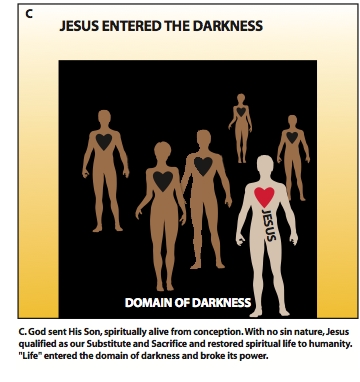 Jesus’ sinlessness was not only defined by the fact that He never committed a sin. Rather, Jesus never sinned because He was sinless. He had no sin nature. As Adventists we learned that sin is passed down to us from our parents, that it is somehow encoded into our gene pool, and that we therefore live with inherited tendencies to evil. Because they understand sin to be essentially genetic, Adventists cannot come to a firm conclusion about whether or not Jesus inherited sinful flesh from Mary.
Jesus’ sinlessness was not only defined by the fact that He never committed a sin. Rather, Jesus never sinned because He was sinless. He had no sin nature. As Adventists we learned that sin is passed down to us from our parents, that it is somehow encoded into our gene pool, and that we therefore live with inherited tendencies to evil. Because they understand sin to be essentially genetic, Adventists cannot come to a firm conclusion about whether or not Jesus inherited sinful flesh from Mary.
Then how are we to understand that there was no sin in Him? The fact is that Jesus was born spiritually alive, unlike the rest of us humans. He was conceived by the Holy Spirit, and His spirit was alive from that moment. He was the only human who never had to be born again. God has not explained the mystery of Jesus’ having sinless flesh, but His identity as the Son of God guaranteed that Jesus was without sin.
Jesus came in the likeness of sinful flesh (Rom. 8:3), a mortal body housing a living spirit, yet He was God the Son, the Creator of those whose flesh He now shared. Because He was the Son of God, He carried life into the doomed race; He was the only One who could make us live again (Jn. 5:25). Moreover, because He was the Son of Man who lived and died in our fallen world yet without sin, He is the only one qualified to be our Judge and Substitute (Jn. 5:27; Heb. 2:14-18).
The turning point in history was when God the Son took on human flesh and was born with an eternally living, sinless spirit into a race that was otherwise condemned to suffer God’s wrath (Eph. 2:3) (see diagram C).
Death swallowed up by life
In order to pay for the sin of all humanity, Jesus had to be an infinite Sacrifice. He had to become sin (2 Cor. 5:21) and become a curse (Gal. 3:13) for the human race. Only our Creator could bear the sin of the entire human race in His own body. He had to be God in order to suffer infinitely on our behalf, and He had to be a sinless human in order to be an acceptable Sacrifice.
When Jesus died, the Father displayed Him publicly “as a propitiation in His blood through faith” (Rom. 3:25) and demonstrated that God was just as well as the justifier of those who have faith in Jesus (Rom. 3:26). In the person of Jesus, God fulfilled the demands of His own law. God took on the doomed flesh of fallen creatures in the person of the Son. He perfectly lived the life His creatures could not live, paid the price God required for sin, and broke the power of death.
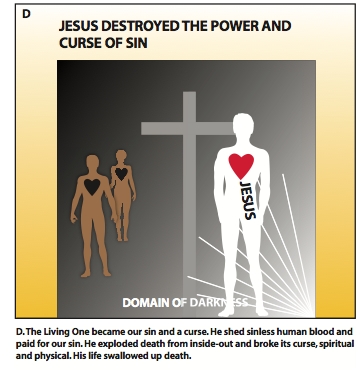 Yes—He broke the power of death! Jesus died just as we do: His spirit left His body and went to God (Lk. 23:46), and his friends buried His body in the tomb. Jesus, however, was also God the Son, and this death was the reason He became human. He had to die as we do in order to destroy the law of sin and death.
Yes—He broke the power of death! Jesus died just as we do: His spirit left His body and went to God (Lk. 23:46), and his friends buried His body in the tomb. Jesus, however, was also God the Son, and this death was the reason He became human. He had to die as we do in order to destroy the law of sin and death.
Because Jesus was God, the Source of our life, His spirit was not dead. He never stopped being God the Son in whom all things hold together (Col. 1:17)—and the miracle happened on the third day. Jesus rose from the dead in a glorified, eternal body!
We often miss the significance of what happened at this point. A man who lived a perfect, sinless life in a mortal body died—but because He was also God the Son, He had eternal life in Himself. By the life in the Trinity Jesus rose from death—His spirit and His body reunited, and death could never touch Him again!
A man had died, and a man came back from death with an eternal body and spirit. Nothing like this had ever happened before! Death had always been the great maw that swallowed life, but Jesus exploded death from the inside-out. Because He had been the perfect sacrifice, God accepted His death as payment for human sin and raised Him from death. At the moment Jesus rose to life, death’s power was broken. What is mortal may now be “swallowed up by life” (2 Cor. 5:4). “Death is swallowed up in victory”! (1 Cor. 15:54) (see diagram D).
Saved by His life
Because Jesus was our Representative and Substitute, His resurrection means we can now come to life eternally. We are the doomed mortals that may now be swallowed up by life! Our natural state of death can be swallowed up in victory!
This is the mystery and miracle of the new covenant. Jesus’ prefect sacrifice has paid for all my sin. Jesus has done everything God required to atone for human sin, and because of His obedience unto death, He has undone the curse into which we all are born. I am no longer doomed to eternal destruction; I can receive the blood of Jesus as payment for my sin!
This is the truth which was never clearly taught within Adventism. We do not contribute to our salvation, nor do we maintain our salvation. When we confess our hopeless sinfulness and believe in the Lord Jesus, in His death as our perfect Substitute and in His resurrection as our hope for eternity, we are transferred by our Father from the domain of darkness into the kingdom of His beloved Son (Col. 1:13). At that moment, having believed in the Lord Jesus and His incredible gift, we pass from death to life (Jn. 5:24) and are sealed with the Holy Spirit of promise Who guarantees our eternal, glorified future (Eph. 1:13-14).
The blood of Jesus is what justifies us: completely, thoroughly, eternally. When we submit to Him and believe that He has done everything necessary for our eternal life, we are born of the Spirit, and we—our spirits—will never die, even though we pass through the valley of death (Jn 11:26).
The resurrection of Jesus is what gives us life. Because Jesus swallowed up death by His resurrection, He has earned the right to give us His Spirit and His life when we receive His gift of blood as the payment for our sin (Rom. 5:10). We become alive in Him, and in Him we receive reconciliation with God (Rom. 5:11).
Jesus’ blood and His resurrection swallow up our spiritual death and give us eternal life. Our spirits are connected with God, and His Spirit now dwells in us (see diagram E).
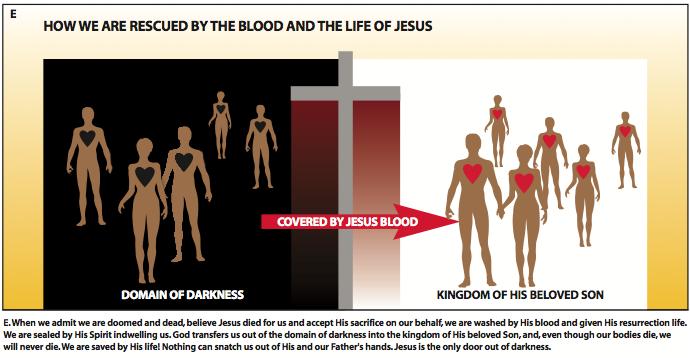
This miracle is the reason Easter has become so meaningful. Jesus didn’t just rise from death as an example of what we can expect in the future. On the contrary, Jesus rose from death so I can have eternal life the minute I believe in Him. When I realize that He has done all that God requires to atone for sin, I can submit to Him and admit my sin. I can give up my desperation to be the best and to make my life successful. I can just give it up—and I can rest in Jesus.
In Jesus I have a new identity and a new Father (Rom. 8:15-17). In Him I have eternal security (Jn. 4:25). In Jesus I have no more condemnation (Rom. 8:1). I know that I can never be separated from God’s love when I am in Jesus (Rom. 8:38-39).
Do you know you are born again? If you are not sure, why not seal the deal right now?
This is Jesus’ word to you:
Come to me, all who labor and are heavy laden, and I will give you rest. Take my yoke upon you, and learn from me, for I am gentle and lowly in heart, and you will find rest for your souls. For my yoke is easy, and my burden is light” (Mt. 11:28-30). †
*Thanks to my friend Steve Pitcher.

Copyright 2012 Life Assurance Ministries, Inc., Casa Grande, Arizona, USA. All rights reserved. Revised April 18, 2012. Contact email: proclamation@gmail.com
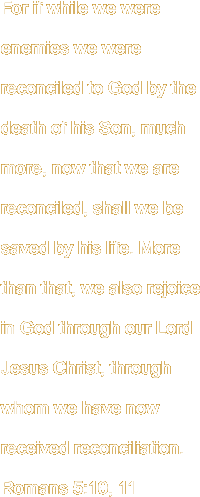
 Colleen Tinker is editor of Proclamation! magazine. She and her husband Richard have co-led Former Adventist Fellowship Bible study at Trinity Church in Redlands, California, since 1999. Formerly a high-school English teacher, she has worked with Life Assurance Ministries since 2004. Colleen and Richard have two adult sons and a granddaughter.
Colleen Tinker is editor of Proclamation! magazine. She and her husband Richard have co-led Former Adventist Fellowship Bible study at Trinity Church in Redlands, California, since 1999. Formerly a high-school English teacher, she has worked with Life Assurance Ministries since 2004. Colleen and Richard have two adult sons and a granddaughter.
